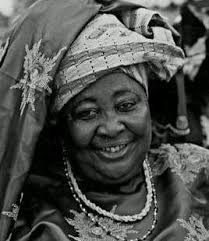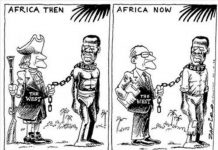 Sawaba had little formal education, as she was brought up in the northern part of Nigeria where women were discouraged and their education neglected. She was forced into an early marriage at age 13. She struggled through all these obstacles to emerge as a sweet, dynamic, independent political activist helping to educate many people.
Sawaba had little formal education, as she was brought up in the northern part of Nigeria where women were discouraged and their education neglected. She was forced into an early marriage at age 13. She struggled through all these obstacles to emerge as a sweet, dynamic, independent political activist helping to educate many people.
Gambo’s father was an educated Christian from Ghana who converted to Islam in Zaria, Northern Nigeria. Gambo’s mother was a widow when she married him. She had a total of 10 children. They lived in Sabon Gari and the family home accommodated visitors from many places.
When young, Gambo was involved in street fights to defend the weak. She was also considered very truthful. She was sympathetic to the mentally challenged and could recommend local herbs as medicines
She went to the Native Authority Primary School when she was nine years old. But she was only to stay for three years as both her father and then mother died. She first married as a teenager and was to marry another three times.
Gambo found oppression was unbearably revolting; hence she stoutly defended the rights of the weak. She did not accept wealth and shared every kobo of hers with the poor.
She was one of the early members of the Northern Elements Progressive Union (NEPU) in Zaria. The party identified with the working class and poor (the Talakawa) that formed their main support base. As a result, she was persecuted by both the colonial authorities and the native administration and was incarcerated more than a dozen times.
The Zaria branch of NEPU stated their goals inline with the official policies of the party, a doctrine of freedom and liberation. But the branch also pursued an anti-corruption campaign.
Gambo was made the women’s leader for the Sabon Gari branch. For about three months, she left Zaria for Abeokuta to meet Funmilayo Kuti. Sawaba had read about her exploits in Abeokuta and her struggle for women’s right in tax matters.
Back in Zaria. the fear of political victimisation was widespread. Many men held their tongues and chose not to speak out politically. But Gambo climbed unto the rostrum to speak, challenging her male colleagues. On that day another speaker, was a NEPU leader called Gambo Sawaba, it was he who gave her the name Sawaba, meaning the redeemer.
Her first political incident with the law occurred in Kano where she was sent to help NEPU with canvassing for women support. As soon as the reports of her activities reached the emir, she was arrested and tried by an Alkali court. She was convicted and sent to prison where a certain warden was accused of misusing her powers. After her release, she went public with the appalling prison conditions but that also got her arrested again.
Sawaba was later asked to leave Kano by the Emir. Northern Nigeria at the time was administered through a system called indirect rule which left the emirs a very powerful lot, so their political party, the Northern People’s Congress, was very powerful indeed.
Sawaba continued with her rising political profile by going door to door to meet with women who were prevented from going to political activities because of the Purdah. She also attended NEPU classes taught by leaders such as Aminu Kano.
Women in northern Nigeria did not even have the right to vote during the first republic (1963 – 1966). They were not involved in development efforts and public affairs generally. The 1979 constitution guaranteed universal adult suffrage for all, regardless of sex. Aminu Kano was one of the architects of that constitution and presidential candidate for the Peoples Redemption Party in 1979.
Sawaba and the Northern Elements Progressive Union (NEPU) frequently spoke of oppression and class conflict. At one point, she claimed that the NEPU was a “socialist party” and the NPC a “capitalist” one. Sawaba also reportedly had a picture of Karl Marx (among others) in her parlour.
During the second republic (1979 -1983), Sawaba was a member of the Great Nigeria Peoples Party (GNPP) and served as a deputy national chair.
In an era when women were expected to do very little more than cook and keep the home, Gambo Sawaba refused to keep quiet. In the face of injustice, she defied convention, prison and norms to stand for what she believed in and it is for this that we salute her.
Like Gambo would say “If I don’t know book, I know rights… I have not been a member of any House of Assembly (legislature). I have not held any office except that I was a member of the House of Prison.”
For more information, see The Gambo Sawaba Story by Rima Shawulu Kwewum.
– Tina Ndi








